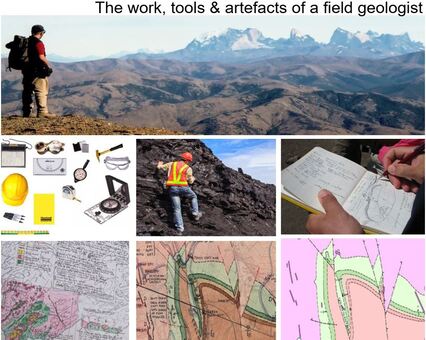
Contribution to the 2019 UK Creativity Researchers Conference
Creativity in Practice : An Ecological Phenomenon
Norman Jackson
To perform any role requiring complex thinking and action involves being able to use perception, imagination and reason to assess a situation, decide what action needs to be taken then pursue it using appropriate behaviours, tools and methodologies, monitoring the effects and responding to feedback (Eraut 2000). This process is at the core of what I am calling an ecology of practice which enables a person to interact with their environment and the things that matter in it, to solve domain specific problems and learn and communicate their understanding through the creation of new disciplinary artefacts.
In the practice environment the motivator for creativity is the intrinsic desire to create value by solving domain specific problems, developing new situated knowledge and creating new cultural artefacts. The process involves ‘the emergence in action of a novel relational product growing out of the uniqueness of the individual on the one hand, and the materials, events, or circumstances of their life’ (Rogers 1961: 350). The ecological perspective I am offering is grounded in the proposition that, ‘A properly ecological approach ……… is one that would take, as its point of departure, the whole-organism-in-its-environment. In other words, ‘organism plus environment’ should denote not a compound of two things, but one indivisible totality’ (Ingold 2000 :16).
I will illustrate the idea of an ecology of practice using the way a field geologist interacts with his environment using the tools of his trade to create cutlural artefacts - notebooks, maps and reports.
References
Eraut M. & Hirsh W. (2007) The Significance of Workplace Learning for Individuals, Groups and Organisations, SKOPE Monograph 9, Oxford University Department of Economics, 96pp
Ingold, T. (2000) Hunting and gathering as ways of perceiving the environment, The Perception of the Environment. Essays on livelihood, dwelling and skill Routledge
Rogers, C.R. (1960) On becoming a person, Boston: Houghton Mifflin
Article: 'From Learning Ecologies to Ecologies for Creative Practice'
Creativity in Practice : An Ecological Phenomenon
Norman Jackson
To perform any role requiring complex thinking and action involves being able to use perception, imagination and reason to assess a situation, decide what action needs to be taken then pursue it using appropriate behaviours, tools and methodologies, monitoring the effects and responding to feedback (Eraut 2000). This process is at the core of what I am calling an ecology of practice which enables a person to interact with their environment and the things that matter in it, to solve domain specific problems and learn and communicate their understanding through the creation of new disciplinary artefacts.
In the practice environment the motivator for creativity is the intrinsic desire to create value by solving domain specific problems, developing new situated knowledge and creating new cultural artefacts. The process involves ‘the emergence in action of a novel relational product growing out of the uniqueness of the individual on the one hand, and the materials, events, or circumstances of their life’ (Rogers 1961: 350). The ecological perspective I am offering is grounded in the proposition that, ‘A properly ecological approach ……… is one that would take, as its point of departure, the whole-organism-in-its-environment. In other words, ‘organism plus environment’ should denote not a compound of two things, but one indivisible totality’ (Ingold 2000 :16).
I will illustrate the idea of an ecology of practice using the way a field geologist interacts with his environment using the tools of his trade to create cutlural artefacts - notebooks, maps and reports.
References
Eraut M. & Hirsh W. (2007) The Significance of Workplace Learning for Individuals, Groups and Organisations, SKOPE Monograph 9, Oxford University Department of Economics, 96pp
Ingold, T. (2000) Hunting and gathering as ways of perceiving the environment, The Perception of the Environment. Essays on livelihood, dwelling and skill Routledge
Rogers, C.R. (1960) On becoming a person, Boston: Houghton Mifflin
Article: 'From Learning Ecologies to Ecologies for Creative Practice'
| ecology_of_practice_field_geologist_draft.pdf | |
| File Size: | 1311 kb |
| File Type: | |
Presentation
| creativity_in_practice_jackson.pptx | |
| File Size: | 1240 kb |
| File Type: | pptx |
LINKS TO OTHER RESOURCES
Creative Academic - website
http://www.creativeacademic.uk/
#creativeHE discussion forum for people interested in creativity
https://www.facebook.com/groups/creativeHE/
Creative Academic - website
http://www.creativeacademic.uk/
#creativeHE discussion forum for people interested in creativity
https://www.facebook.com/groups/creativeHE/